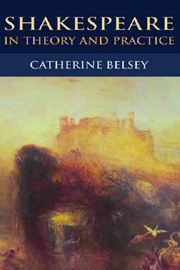Book contents
- Frontmatter
- Contents
- Preface
- 1 Introduction: Practising with Theory
- 2 Psychoanalysis and Early Modern Culture: Lacan with Augustine and Montaigne
- 3 Love as Trompe-l'oeil: Taxonomies of Desire in Venus and Adonis
- 4 Tarquin Dispossessed: Expropriation and Consent in The Rape of Lucrece
- 5 Antinomies of Desire and the Sonnets
- 6 Peter Quince's Ballad: Memory, Psychoanalysis, History and A Midsummer Night's Dream
- 7 The Illusion of Empire: Elizabethan Expansionism and Shakespeare's Second Tetralogy
- 8 Making Histories Then and Now: Shakespeare from Richard II to Henry V
- 9 The Case of Hamlet's Conscience
- 10 Iago the Essayist
- Notes
- Index
4 - Tarquin Dispossessed: Expropriation and Consent in The Rape of Lucrece
Published online by Cambridge University Press: 12 September 2012
- Frontmatter
- Contents
- Preface
- 1 Introduction: Practising with Theory
- 2 Psychoanalysis and Early Modern Culture: Lacan with Augustine and Montaigne
- 3 Love as Trompe-l'oeil: Taxonomies of Desire in Venus and Adonis
- 4 Tarquin Dispossessed: Expropriation and Consent in The Rape of Lucrece
- 5 Antinomies of Desire and the Sonnets
- 6 Peter Quince's Ballad: Memory, Psychoanalysis, History and A Midsummer Night's Dream
- 7 The Illusion of Empire: Elizabethan Expansionism and Shakespeare's Second Tetralogy
- 8 Making Histories Then and Now: Shakespeare from Richard II to Henry V
- 9 The Case of Hamlet's Conscience
- 10 Iago the Essayist
- Notes
- Index
Summary
Lucrece tells a story about possession and dispossession. The woman at the centre of the narrative is treated as the proper possession of her husband – or perhaps her father: propriety evidently defines women as property in Shakespeare's Rome. But possessions can be expropriated and property owners may be dispossessed. Tarquin takes improper possession of the faithful wife of his comrade-in-arms on the basis of an irresistible desire and, thus possessed, in the distinctive sense that he is impelled to act against his own judgement, Tarquin loses his self-possession and, as a result, his identity as friend, kinsman, prince, Roman lord. At the last, publicly exposed, shamed by Lucrece's suicide, and driven in consequence from what was his proper place in Rome, along with the entire royal family that has taken possession of the city, Tarquin is doubly dispossessed by a woman's constancy.
Recent criticism is divided on the sexual politics of the poem. Reacting incisively against those male readers who had followed St Augustine to find Lucretia guilty of vainglory or, worse, colluding with her own rape, critics influenced by feminism have predominantly seen Shakespeare's Lucrece as, instead, the victim of patriarchal values, whether the passive object of a struggle between men, or complicit in her suicide with masculine misogyny. A minority of other equally feminist arguments, however, powerfully defend her as an exemplum of female virtue, or hold her up as a model of resistance to patriarchy.
- Type
- Chapter
- Information
- Shakespeare in Theory and Practice , pp. 54 - 72Publisher: Edinburgh University PressPrint publication year: 2008



